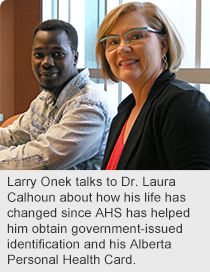
November 5, 2014
Story by Shelley Rattray; photo by Kristin Bernhard
Larry Onek feels like, for the first time in a long time, he’s heading in the right direction.
The 27-year-old Calgary man is now off the streets and getting regular medical attention after acquiring government-issued identification and his Alberta Personal Health Card through the ID for Homeless Healthcare Project, a pilot project launched last year by Alberta Health Services (AHS).
The project identifies individuals who seek care at an AHS facility but don’t have government-issued identification and/or health care cards. Social workers at AHS facilities in Calgary have been trained to help patients fast-track these vital documents, which also help to discharge patients in a timely manner.
 Onek entered the program earlier this year.
Onek entered the program earlier this year.
“I knew that by not having an ID card or a health care card, I had a tougher time getting the supports and services I needed – but I had no idea how to get ID or a card,” he says.
“My social worker helped me through the process and got me my ID and health care card. I couldn’t have done it without her. And now I’ve been able to get regular care for my conditions and I’ve been able to apply for social assistance, which got me off the street and housed right after I left hospital. For the first time in years, I’m really proud and happy about where I am right now.”
This is the sort of success story that Dr. Laura Calhoun had in mind when AHS – in partnership with Alberta Health, Human Services, Service Alberta, and the Solicitor General – developed the program.
“Without government-issued identification, patients weren’t able to be referred to specialists or access community supports and, at times, they were returning to hospital because their health would deteriorate. Now, we are better able to help them manage their care,” says Dr. Calhoun, Provincial Medical Director for AHS Addiction and Mental Health.
“This project has helped us to remove barriers to care, decrease length of stay in hospital and, for some of our patients, it’s helped them obtain employment and housing. It’s truly making a difference for Albertans.”
It takes about an hour to complete and submit the paperwork, and identification and health care cards are typically issued within two weeks.
As part of the Calgary project, a repository has been established at Sheldon M. Chumir Health Centre, where homeless patients can store their newly obtained identification and/or health care card until they have the ability to secure these documents independently.
Homeless patients can then refer their health care providers to this repository wherever these patients are seeking care.
The success of the Calgary pilot project has prompted AHS to expand the ID for Homeless Healthcare Project, including secure repositories for patients, to Edmonton, Grande Prairie, Lethbridge, Medicine Hat and Red Deer over the next year.